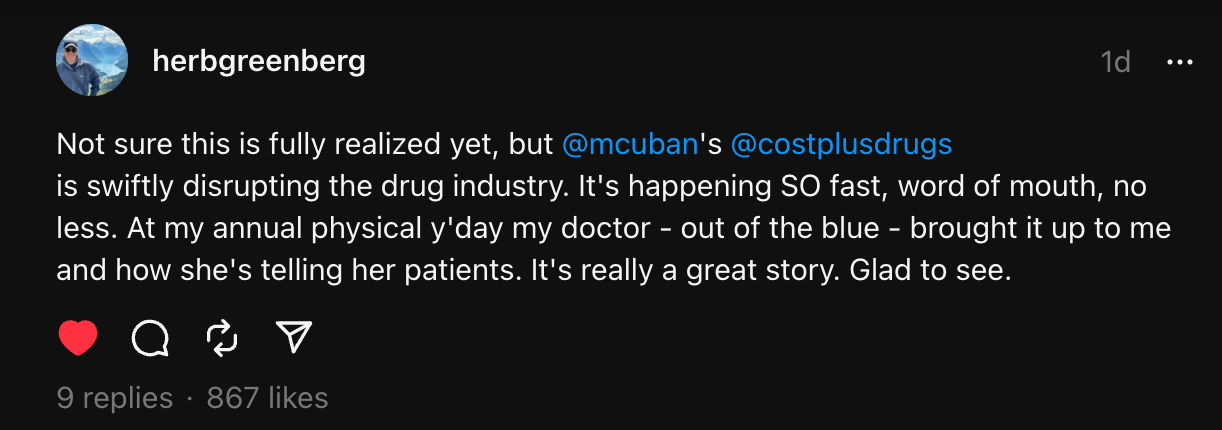It's rare you see something this big get this disrupted this fast – and almost entirely by word-of-mouth...
I'm referring to the way billionaire entrepreneur Mark Cuban's Cost Plus Drugs seems to have upended the drug industry. (Disclosure: I'm a happy customer and have written about it previously here at Empire Financial Daily.)
Obviously, this is all anecdotal, and I have no idea if Cost Plus is anywhere near – or on its way – to becoming a financial success... or what impact it’s really having.
I should also point out that not everybody thinks that Cost Plus is causing a "disruption." (More on that in a moment.)
But what I do know is this: There's something happening here, and what it is seems to be pretty clear...
Cost Plus appears to have done something nobody else has seemingly been able to do: Cut out the middlemen and, for the most part, negotiate directly with drug manufacturers or a few friendly less egregious middlemen to get lower prices... at least on generics.
It's not as simple as that, of course... but Cost Plus has come out of nowhere to become a force in mail order pharmacies by charging 15% over what it pays the manufacturer.
Mind you, right now these are all generic drugs – but that's the beauty of it...
With generics, you know how irrationally high the prices of some have become. The absurdity of that is that the promise of generics was that prices would be low.
Something obviously got lost in translation, because at some point between here and there prices seemed to go higher and higher and higher. Ever seen what some plans charge for something as common as the generic version of the antibiotic amoxicillin/clavulanate potassium, better known as Augmentin? It's nuts.
I pin the blame on the growing influence of pharmacy benefit managers ("PBMs"), who act as the middlemen between the insurance company and the drug manufacturers. I've written about them a few times, including in the June 23 On the Street, when I refer to them "legal drug cartels."
After all, they're the keepers of those so-called drug "formularies" that control which drugs are covered under which health care plan. The absurdity of that, of course, is that the very same drug might be in your spouse's or friend's formulary... and every year whatever drugs might have been in anybody's formulary very well may have changed.
That, in turn, creates chaos for everybody, meaning you and your doctor and your doctor's office...
While the concept of PBMs might have made sense in the beginning – a go-between to negotiate the best prices – it appears they got so big and so full of themselves (as a group) that they wound up breaking the very system claimed they would fix.
There has been plenty of lip service, hearings, and political theater over the years on how broken the system is, but nothing has ever happened.
I know, I know – Medicare is finally getting the green light to negotiate on prices for a whopping 10 drugs. It's a start, but based on the way the government works, it'll take years for this to be meaningful... and that's assuming politics doesn't get in the way.
Not that it matters, because Cuban seems to have executed on a concept that others have only talked about... and he's done it in less than two years.
While Cuban is the brand name and cachet behind Cost Plus, the company was the brainchild of radiologist Alexander Oshmyansky, who pitched the idea to Cuban.
Cuban saw the vision and opportunity, and here we are.
As of this week, Cost Plus has 1,096 drugs... and the list keeps growing.
Just last month, California Blue Shield tapped Cost Plus and Amazon (AMZN) to replace CVS Health's (CVS) Caremark as its preferred drug providers.
Unless I'm really sick and need something immediately, which doesn't happen often, I compare prices of my supplemental provider with Cost Plus and using a coupon from GoodRx (GDRX).
GoodRx still has its moments, but usually over insurance. Cost Plus takes some insurance, but for my meds it's the cheapest way to go.
I didn't realize just how disruptive Cost Plus has become – or might become – until I had my annual physical the other day...
Before we could even start on the exam, out-of-the-blue my internist started asking about what I knew about Cost Plus.
She told me she has been referring it to her patients as well as other doctors, and was eager to learn more.
I even mentioned my exchange with her on Threads, posting...
Cuban then replied...
Which I did!
Within a short amount of time, I had more than 800 "likes," which on Threads is a lot – suggesting just how fed up consumers are fed up.
The significance of what Cost Plus has done can be seen in some of the comments to Mark, such as...
"I tell my patients as well! Please add Dementia medications!!"
"Cost plus is awesome. My $250 market price drug is $25 from your site. You have done a tremendous public service, thank you!!!"
"I was on a trip to Vietnam and someone in our travel group started taking about how great Cost Plus is and I said I know, I already use it."
"I've been telling everyone... and my doc's nurse says she tells other patients."
It was our doctor who told my wife to go to Cost Plus for an inhaler she had scrambled to find using GoodRx at what appeared to be a great reduced price from the exorbitant (as in the hundreds of dollars) price seemingly everywhere. The Cost Plus price was 25% below the cheapest competition, or $60 instead of $80.
It's like people have taken matters into their own hands, but is it really disruptive?
Dan Munro, who writes about health care policy and technology for Forbes – and who authored the book Casino Healthcare – doesn't think so. Or as he said to me on Threads...
It will help more patients to afford some Rx – but it's hardly disruptive b/c it has zero impact on the Rx patent casino – and it will put upward pricing pressure on many expensive drugs. Footnote: The whole function of PBM's is to tier pricing – and while that function may be assimilated by payers (underway) – it won't go away.
I responded that he made great points, "but on the generics side all I know is that there has been a change because many of us are paying considerably less than we were. Someone somewhere has been disrupted."
As Munro shot back...
Yes. It will help some – but it's just so incremental – as is Medicare negotiating some Rx prices (10 next year). As long as healthcare prices (incl Rx) are uncapped – we're just squeezing a balloon.
Munro knows more about this than I do, and what he says makes sense.
But for the average person, every little bit helps. And for many people, this is helping quite a bit.
Disruption, like everything else, is in the eyes of the beholder.
Moving on – now to pay the bills…
Not everything about the drug industry is broken... or bad.
For that reason I recommended drugmaker Novo Nordisk (NVO) when I launched my Empire Real Wealth newsletter last September.
Novo's drug Ozempic has been a game changer for treating obesity, and shareholders have been accordingly well rewarded – since that inaugural Empire Real Wealth issue, readers who followed my advice to buy NVO shares are up 87%.
Amid the madness in this market, I'm focusing on these kinds of stable, blue-chip companies. As I put it last year...
With Empire Real Wealth, we're helping you take back control of your portfolio... your retirement account... and your future.
In investing, there's no such thing as "set it and forget it"... but this high-quality portfolio comes close...
Of course, these stocks could go down in any given quarter or year – especially during a bear market, but also on disappointing results or something else that spooks investors. But we’re not recommending these for a quarter... or a year.
You can learn more about Empire Real Wealth – including how to gain instant access to the entire portfolio of open recommendations – by clicking here.
DISCLAIMER: This is solely my opinion based on my observations and interpretations of events, based on published facts, and should not be construed as investment advice.
(I write two investment newsletters for Empire Financial Research, Empire Real Wealth and Herb Greenberg’s Quant-X System. For more information, click here and here.)
Feel free to contact me at herbgreenberg@substack.com. You can follow me on Twitter @herbgreenberg.







Good one Herb. I read somewhere that the common ADHD drugs are going to be generic soon. That will be big. I am not generally a big fan of the Biden administration but they have some good people like Lina Khan who are standing up for ordinary people against corporate interests. Going after monopolies etc
I had a friend buy Amoxycillin while overseas. It's cheaper than candy in Asia.